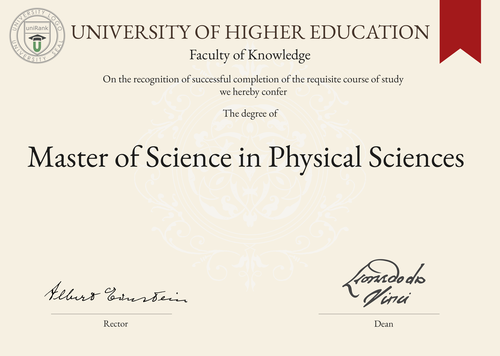
Master of Science in Physical Sciences (MSc in Physical Sciences)
Guide to Master of Science in Physical Sciences Program/Course/Degree
Master of Science in Physical Sciences (MSc in Physical Sciences)

Program Name
Master of Science in Physical SciencesProgram or Degree abbreviation
MSc in Physical SciencesDuration range
The duration of the program typically ranges from 1 to 2 years, depending on the university and country.Tuition range
Tuition fees for the program can vary significantly depending on the chosen country and university. It is recommended to check with specific institutions for accurate information.Overview
The Master of Science in Physical Sciences program is designed to provide students with advanced knowledge and skills in various areas of physical sciences. It offers a comprehensive understanding of fundamental principles and theories in disciplines such as physics, chemistry, astronomy and geology.Curriculum Overview by year
The curriculum of the program is typically structured to cover both theoretical and practical aspects of physical sciences. The coursework is divided into different modules or subjects, which are usually completed over the course of two academic years. Specific courses may include Quantum Mechanics, Thermodynamics, Electromagnetism, Spectroscopy and Computational Physics.Key Components
The key components of the program include theoretical knowledge, laboratory work, research projects and seminars. Students are encouraged to engage in hands-on experiments, data analysis and scientific research to develop critical thinking and problem-solving skills.Career Prospects
Graduates of the Master of Science in Physical Sciences program have a wide range of career opportunities. They can pursue careers in research and development, academia, industry, government agencies and consulting firms. Potential job roles include research scientist, data analyst, quality control specialist, environmental consultant and science educator.Salary Expectations
Salary expectations for graduates of the program can vary depending on factors such as location, industry and level of experience. Generally, individuals with a Master's degree in Physical Sciences can expect competitive salaries, with the potential for growth and advancement in their careers. For a more accurate understanding of salary expectations, you can utilize the Job Sites Search Engine, from our sister site jobRank, which searches over 4,600 job sites worldwide. Make sure to specify not only the job title but also the country you are interested in.Conclusions:
It is important to note that the duration, tuition fees, curriculum, key components, career prospects and salary expectations of the Master of Science in Physical Sciences program can vary depending on the chosen country or location of study, as well as the specific university. Prospective students are advised to research and compare different institutions to find the best fit for their academic and career goals. Visitors can search for where this specific degree, MSc in Physical Sciences, is offered anywhere in the world through the uniRank World Universities Search Engine.World Universities Search Engine
search for Master of Science in Physical Sciences (MSc in Physical Sciences) and add the Location (country, state etc.) or specific University you are interested in studying at.
Query examples:
- Master of Science in Physical Sciences (MSc in Physical Sciences) United States
- Master of Science in Physical Sciences (MSc in Physical Sciences) United Kingdom online
- Master of Science in Physical Sciences (MSc in Physical Sciences) Australia international students
- Master of Science in Physical Sciences (MSc in Physical Sciences) University of California
- Master of Science in Physical Sciences (MSc in Physical Sciences) University of London tuition fees
- Master of Science in Physical Sciences (MSc in Physical Sciences) University of Sydney scholarships
Share Program/Course
Interesting? Share this program/course/degree info with your friends now.